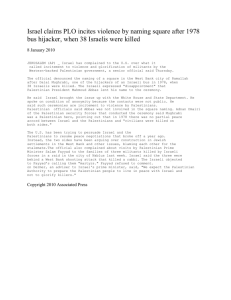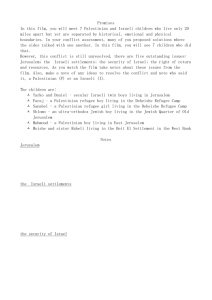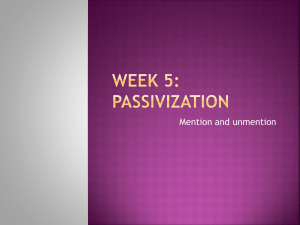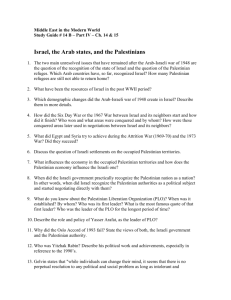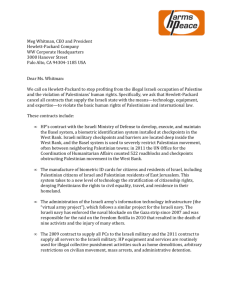DIVESTMENT or CONSTRUCTIVE INVESTMENT? Alternative Responses to the Arab-Israeli-Palestinian Conflict
advertisement
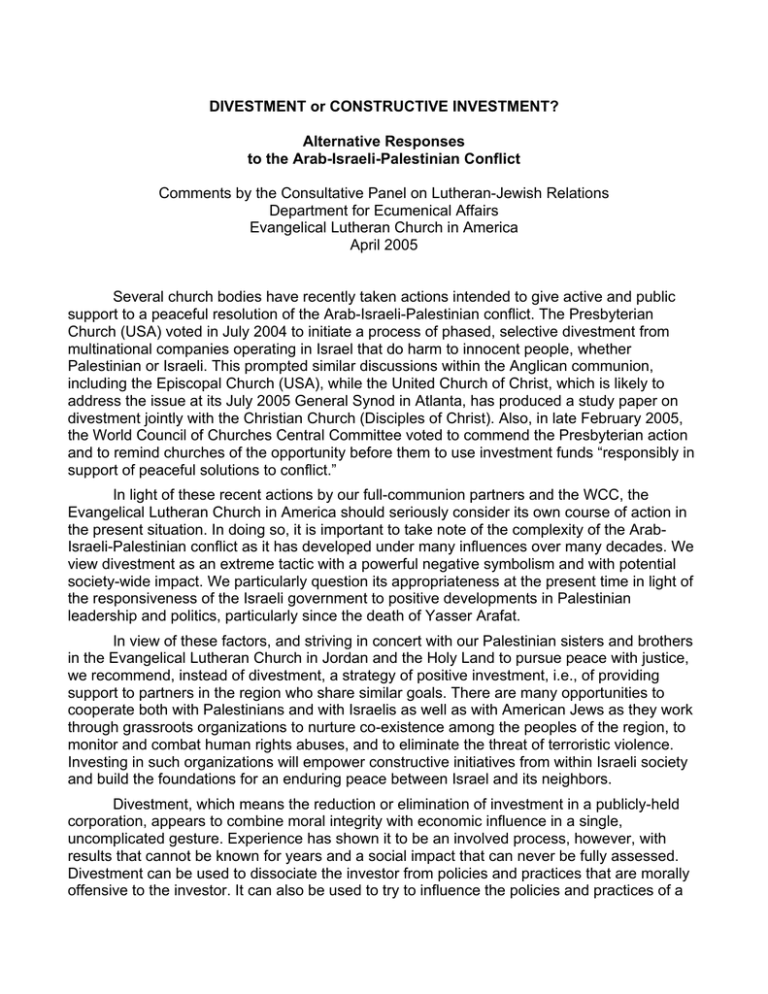
DIVESTMENT or CONSTRUCTIVE INVESTMENT? Alternative Responses to the Arab-Israeli-Palestinian Conflict Comments by the Consultative Panel on Lutheran-Jewish Relations Department for Ecumenical Affairs Evangelical Lutheran Church in America April 2005 Several church bodies have recently taken actions intended to give active and public support to a peaceful resolution of the Arab-Israeli-Palestinian conflict. The Presbyterian Church (USA) voted in July 2004 to initiate a process of phased, selective divestment from multinational companies operating in Israel that do harm to innocent people, whether Palestinian or Israeli. This prompted similar discussions within the Anglican communion, including the Episcopal Church (USA), while the United Church of Christ, which is likely to address the issue at its July 2005 General Synod in Atlanta, has produced a study paper on divestment jointly with the Christian Church (Disciples of Christ). Also, in late February 2005, the World Council of Churches Central Committee voted to commend the Presbyterian action and to remind churches of the opportunity before them to use investment funds “responsibly in support of peaceful solutions to conflict.” In light of these recent actions by our full-communion partners and the WCC, the Evangelical Lutheran Church in America should seriously consider its own course of action in the present situation. In doing so, it is important to take note of the complexity of the ArabIsraeli-Palestinian conflict as it has developed under many influences over many decades. We view divestment as an extreme tactic with a powerful negative symbolism and with potential society-wide impact. We particularly question its appropriateness at the present time in light of the responsiveness of the Israeli government to positive developments in Palestinian leadership and politics, particularly since the death of Yasser Arafat. In view of these factors, and striving in concert with our Palestinian sisters and brothers in the Evangelical Lutheran Church in Jordan and the Holy Land to pursue peace with justice, we recommend, instead of divestment, a strategy of positive investment, i.e., of providing support to partners in the region who share similar goals. There are many opportunities to cooperate both with Palestinians and with Israelis as well as with American Jews as they work through grassroots organizations to nurture co-existence among the peoples of the region, to monitor and combat human rights abuses, and to eliminate the threat of terroristic violence. Investing in such organizations will empower constructive initiatives from within Israeli society and build the foundations for an enduring peace between Israel and its neighbors. Divestment, which means the reduction or elimination of investment in a publicly-held corporation, appears to combine moral integrity with economic influence in a single, uncomplicated gesture. Experience has shown it to be an involved process, however, with results that cannot be known for years and a social impact that can never be fully assessed. Divestment can be used to dissociate the investor from policies and practices that are morally offensive to the investor. It can also be used to try to influence the policies and practices of a company and to exert economic pressure on a government. Whatever objective is pursued, a responsible divestment process will include a clear statement of goals, will monitor the tactic’s effectiveness, and will assess its unintended consequences. Meeting clear objectives and minimizing unintended consequences are both daunting challenges in the context of the Arab-Israeli-Palestinian conflict. First, the interconnectedness of the Israeli and Palestinian economies makes any application of a divestment tactic difficult. Identifying places to divest that will have the intended effect is hard enough, but even harder is avoiding broad harm in collateral areas. Second, the ELCA’s statements on the Mideast situation do not call for destabilizing the Israeli government or economy. What they call for are specific actions such as an end to settlement activity in the Palestinian territories, humane administration of Palestinian areas under Israeli control, and negotiations leading to a viable, contiguous Palestinian state alongside a secure, viable Israeli state. Third, the conflict is not only a result of Israel’s policies and practices, but also of Palestinian policies and practices and those of neighboring Arab states. When churches adopt divestment initiatives directed against Israel, the Jewish community hears Israel being likened to the former apartheid regime in South Africa in a comparison that many see as delegitimizing Israel’s very existence. It also recalls the longstanding Arab boycott that was designed to undermine Israel’s economy and existence, and that still prevails to no small extent. The Jewish community also takes note that the churches do not act similarly regarding human rights abuses and state violence in many other places in the world. These perceptions can lead to serious, yet unintended consequences. The constructive relationship between Jews and Christians in America today is the result of many years of dialogue as well as side-by-side work towards common goals in the alleviation of poverty and discrimination. This relationship is seriously undermined when Israel is made solely responsible for a complex conflict and divestment is used as a tactic to punish it anew. In addition, the public airing of divestment tactics can embolden extremist elements in the Arab and Palestinian communities, persuading them that their violence and terrorism have begun to swing church and world opinion in their favor. The ELCA’s efforts to work constructively for a hopeful resolution are not well served by a tactic that is difficult to apply selectively and that discourages long-time partners, while emboldening advocates of extremist violence. Hope for the future of the Holy Land rests in the constructive work being done in Israel as well as Palestine in the fields of interreligious encounter, human rights advocacy, and intellectual creativity. As a church committed to accompanying all the people of the Holy Land, the ELCA can choose, rather than divesting from Israel, to invest its advocacy, volunteer work, and financial resources in those who share in the quest for peace with justice. As we seek to offer encouragement in this time of hope, our focus and our efforts are best directed to supporting those who are demonstrably making a positive difference on the ground. RECOMMENDED PARTNER ORGANIZATIONS WORKING FOR PEACE WITH JUSTICE IN ISRAEL AND PALESTINE The organizations listed below are recommended by the ELCA Consultative Panel on Lutheran-Jewish Relations as sharing the goals of this church for peace with justice in the Holy Land. They are independent organizations with no formal affiliation to the ELCA. The list is provided for the information and consideration of ELCA members, congregations, pastors, and agencies in conjunction with the April 2005 document, “Divestment or Constructive Investment? Alternative Approaches to the Arab-Israeli-Palestinian Conflict.” Rabbis for Human Rights is an Israeli organization that advocates on behalf of human rights from a religious perspective. Founded by a group of 15 rabbis – Orthodox, Conservative, and Reform – it has since grown in both membership and prominence. It received an award from the Speaker of the Israeli Parliament (Knesset) for its work in advocating human rights, nurturing interfaith understanding and supporting the peace process. Its primary focus has been the violation of the human rights of West Bank Palestinians and Israeli Arabs. Website: www.rhr.israel.net Physicians for Human Rights–Israel (PHR) joins health professionals from Israel, the West Bank and Gaza who work against abuses of human and medical rights. Its activities include protecting the right of individuals to receive medical care in Israel when services in Palestinian Authority areas are unavailable; coordinating free diagnostic and therapeutic services at clinics operated by PHR members; securing entry permits from Israeli authorities to ensure freedom of movement for Palestinian patients and medical professionals, and defending the medical rights of detainees and prisoners. Website: www.phrusa.org/healthrights/phr_israel.html Seeds of Peace, founded in 1993 by an American author and journalist, brings Arab and Israeli teenagers together at a summer camp in Maine for a month-long program that combines sports and arts activities with daily conflict-resolution sessions led by professional American, Arab and Israeli facilitators. The project aims to reach young people before their fear, mistrust, and prejudices have permanently shaped their vision of the "enemy." The Seeds of Peace Center for Coexistence in Jerusalem offers year-round activities for alumni of the program to sustain their friendships and commitment to coexistence, as well as reaching out to many other Israeli and Palestinian young people. Website: www.seedsofpeace.org International Center of Bethlehem. This is a Lutheran-based, ecumenically-oriented institution serving the Palestinian community, with an emphasis on children, youth, and women. Through empowering local leaders, developing human resources, cultivating artistic talents, and facilitating intercultural encounters, the ICB promotes the building of Palestinian civil society. Its Addar Cultural & Conference Center is the site of numerous performances, conferences, and consultations. Also connected with the ICB is an alternative school for grades K12 and a college-level academy. Website: www.annadwa.org Palestinian Center for Rapprochement between People. This community center in Beit Sahour, in addition to its service to the local community, sponsors dialogues aimed at developing mutual understanding, activating participants to work for peace and justice, educating and training for peace and reconciliation, and increasing the public role in building a just and lasting peace in the region. Website: www.rapprochement.org B’tselem, which takes its Hebrew name from the biblical affirmation that all people are created in God’s image (Gen. 1:27), is the Israeli Information Center for Human Rights in the Occupied Territories. Its maps of the “facts on the ground” have become a standard for assessing the progress toward peace and mutual dignity. Its legal team has developed cases against abuses by Israeli police and soldiers and its staff has testified in the Knesset regarding policies and procedures that impinge on the lives of Palestinians on a day to day basis. Website: www.btselem.org Interreligious Coordinating Council in Israel. Founded in 1991, the ICCI is an umbrella organization for more than 70 institutions and grassroots religious programs that work for multicultural, interreligious understanding and co-existence. Throughout the conflict of recent years, member organizations of the ICCI have continued to engage thousands of Palestinians and Israelis, both Jews and Arabs, in working toward a peaceful multicultural society with religious diversity. Website: www.icci.org.il Department for Ecumenical Affairs Evangelical Lutheran Church in America 8765 West Higgins Road Chicago, Illinois 60631 Phone: 1-800-638-3522 Fax: 773-380-2977 www.elca.org/ea
